#brazilian gold towns
Text
Brazil: Land of the Future :: Stefan Zweig
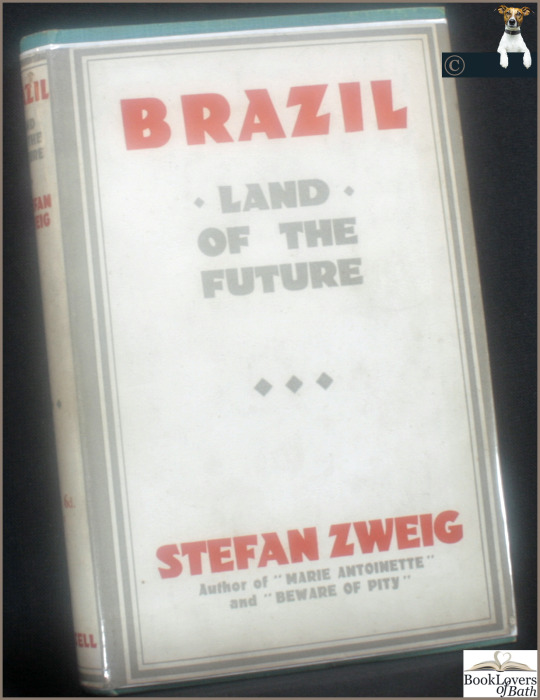
View On WordPress
#andrew st james#books by stefan zweig#brazilian civilization#brazilian culture#brazilian economy#brazilian gold towns#brazilian history#brazilian political history#brazilian politics#brazilians#buenos aires#campinas#culture brazil#historic brazil#history brazil#matto grosso#political unrest#rio de janeiro#rio sao francisco#sao paulo#south american history#south american republics
1 note
·
View note
Text
I have been thinking of my Swimmer Steve au babyyyy...
Except. It isn't Will that gets stuck in the upsidedown. Its Dustin. His mom flips her shit and reports it that night, calling Karen and then Sue and then Joyce. No one's seen her boy.
Susan holds her hand as she looks through pictures for his missing poster. (they have been best friends since childhood and Lucas and Dustin have know each other since birth). She refuses to believe Dustin ran away or got lost in the woods because he knows better than that. Wouldn't have left Will by himself just to get lost in the woods!!
Joyce gets Jonathan to help put up posters at the highschool, and Robin and Steve see it and are like oh that's sad...but how are we, fifteen and sixteen year olds, supposed to help. And continue on with their regularly scheduled Tuesday plans.
Which is why Steve swims in his pool for probably the last time of the season, it's getting way too cold and he should have drained it before Halloween anyways, and pulls on sweats and a hoodie before tugging the pool cover, accidentally cutting his hand on the crank. (It's getting cold and his hands are drying out so his skin just caught and tore a little) and then he's gone.
Last post etc. Robin freaks and bikes to the police station to report Steve missing at lunch. His parents won't be home for another week and no one else besides his coach would even really care he's gone except maybe Nancy, who Steve is sorta dating after the teasing about Brazilian Gymnast made it clear that Buckley and Harrington weren't dating (yet, some say) but Nancy doesn't know his schedule well enough to know something's wrong soon enough.
And when asked how she knows he wouldn't skip town by a disinterested police officer OR Jonathan Byers I haven't decided which, (disregarding the fact his car was still in the driveway) a stressed and upset Robin says "because he would have taken me with him!" Because he would have. They'd talked about it, leaving Hawkins once they graduate and not looking back. Getting an apartment together and maybe working the same shitty retain job to make ends meet as she coaches him into gold medals.
If Steve were to run away, he would have taken her with him. But he didn't. Robin was still in Hawkins and Steve was gone. He didn't run away.
And then Dustin's "body" is found. Claudia knows it's not her boy. They didn't let her close to him but she saw, she saw, that the corpse on the table had front teeth, and her Dustin didn't. Susan Sinclair is beside her, nodding, and stands behind her as she tells Chief Hopper this. That it couldn't be her son because he had a condition, his teeth hadn't come in yet and he didn't have collar bones.
Meanwhile, Jonathan develops the pictures he took while going through the woods trying to help look for Dustin. He has one of Steve, standing bare footed in the pool gutter with his sweats rolled up, grimicing at his sliced hand, as something looms behind him. No Robin don't worry about the picture of shirtless and dripping Steve before that it's nothing a misshot don't mention it again
Dustin, who was pretty ambivalent about Hawkins' resident Olympic hopeful, clings to him in the upsidedown. He's glad he's bigger than Dustin and strong enough to be able to carry him if they need to run fast. Steve's gotten a bat out, already splattered with gore from whatever thing dragged them here, using shoes from the weird, nasty version of his house, and tells Dustin funny stories about his adventures with Robin as he keeps watch while Dustin tries to talk to his mom on the phone or to get the Christmas lights to blip in Morse code.
As Claudia and Sue discuss what's happening and how to get someone to believe them, the lights in the Henderson house keep flickering.
#swimmer steve au#steve Harrington#dustin henderson#robin buckley#platonic stobin#steve and dustin#dw joyce and hop obviously join as well.#finds writes stuff#stonathan#just a little biiiit hehe#finda's rambles
545 notes
·
View notes
Text
My Western AU Pitch:
The year is sometime around 1878, and the place is a small little mining town called Perfection out in New Mexico Territory (about where the border between modern Arizona and modern New Mexico would be, for reference.)
Our protagonist is escaped Brazilian convict Cellbit and his posse of fellow Brazilian convincts + Felps, who is kinda just happy to be here. They all get to Perfection and immediately kinda hate it because, see, the government is getting a bit too invested in its future.
The townspeople are nice- Bad, the local undertaker-slash-priest; Foolish, the town's only doctor; Roier and Jaiden, who both help run the town's saloon with Roier's 'cousin' Melissa performing. But then there are the town's twin sheriffs, Los Ositos, known for their bear-like asshattery and general unpleasantness.
Cellbit kind of fucking hates them. For sheriffs, they're more invested in making their town look good for the government than actually stopping crime, and that's saying something coming from him.
But, because this is the Wild West, there are also some goddamn bandits in the hills:
A man said to have skin made of solid gold, a punishment from God for stealin' all the gold outta the Ohio River Valley back during the Revolution
A demon sent straight from Hell Itself to terrorize the town and punish it for its wicked ways by... stealing all of the furniture...
A woman with the wings of an eagle who swoops in at night to steal cattle from the local ranch
A child with a bull's head who can't speak any language known to man, forever cursed to wander the earth in silence as punishment for his actions
A half-man, half-spider with the fastest draw in the west and a killin' streak a mile wide
And so Cellbit makes a bet. If he catches these criminals first, then he gets to be the sheriff and Los Ositos have to leave town forever. If the twins catch them first, then Cellbit has to work for them until the day he dies.
And it's a set deal until Cellbit wakes up one night to find a child with a cow's head in his room rifling through his belongings and he realizes, shit, this might be a bit harder than he thought it'd be.
81 notes
·
View notes
Text
gold rush: Richie/Eddie + meeting during the 27 years (3/3)
Summary:
Eddie “meets” Richie at a bar while they’re both out of town for work, and immediately decides right now is the perfect time to have his midlife crisis.
“Okay, alright,” Ben placates when the laughter goes long, gesturing for everyone to settle down, only half genuine. “How ‘bout you, Eddie? You married?”
“Uh, no,” Eddie mumbles, emerging reluctantly from his one-handed cocoon. He debates for a moment, feeling sick. But he has to make sure Richie gets the full picture, now that he has to have any of it. “Engaged. Or I was a year ago, anyway.” Richie goes still and silent next to him, his hands freezing where they had been using his chopsticks to whack out a shitty little drumline on the cloth-covered table.
“What happened?” Ben asks softly, sympathetically. Eddie’s throat hurts; the truth hurts. He coughs it away as best he can.
“I moved,” he says. “For- uh. For work.” Like Pretty fucking Woman. Richie fumbles putting down his chopsticks, tucks his hands under the table. Eddie watches him do it through his peripheral vision.
“Sorry to hear that, Eds,” Mike murmurs across the now quiet table. Eddie tenses up to hold back a flinch at the nickname. Richie came up with that nickname. Twice. He hasn’t used it since they got here.
“So, anyway!” Richie says instead, cutting through the atmosphere like a fucking anvil, like he always did as a kid. He brings his hands back up to gesture wildly. “Ben! Where’s the rest of you?”
“I- Yeah, I guess I lost a few pounds,” Ben says, chuckling awkwardly. Eddie, Bill, and Mike all make noises of agreement - Eddie maybe a little more enthusiastically than required, latching onto the change of subject eagerly.
“You’re hot!” Richie gushes. Eddie can’t help but look Ben over, almost as if directed to do so by Richie’s words. His eyes sweep up and down Ben’s body like a compass needle sweeping around to point North. He admires, for a moment, Ben’s somewhat dainty wrists, his bulging shoulders, his thick thighs under the table. The tightness of his fucking cowboy jeans, too, makes for a prettier picture in between them than a looser fit would provide.
But then Richie goes on. “You’re gorgeous, man! You’re like if every Brazilian soccer player was rolled into one person.” He pauses there, and sitting so close at hand, Eddie can hear him take a shaking breath, hyping himself up. Braced, he finishes, “Do you like men? Asking for a friend.”
Suddenly, Eddie isn’t so enthused with this topic anymore.
Read The Final Chapter ->
Or Start From The Beginning
@imsodonewiththissite @anderperries @paufrommexico
Sign up here to be tagged when I post IT fic.
30 notes
·
View notes
Note
Do you have something about morning crew (with bagi, Mike and children) being weird, creepy and unsettling, Addams family style?
okay. this is a bit different but i liked the thought and hopefully you do too?
-
There was a house at the top of the hill. Every child in the neighborhood knew about it. The strange noises that came out of it at night, the weird collection of children and adults that seemed to live there like some kind of strange family.
The first one that the town met was a tall woman with white hair, a singular streak of brown framing the left side of her face. Besides this her most identifying feature was a large brown trench coat that she wore no matter the weather. If asked about it she would simply stare at you with wide empty eyes before saying, “It belonged to my brother.”
Two of the guys were almost never seen apart. They sported bright blue and green clothes that seemed so harsh and strange in their house of dull colors and oddities. The man in the blue was the nicest. He loved playing with the village kids once they opened up to him but they lived in a bit of fear of his pink haired friend, always equipped with a smile too big for his mouth.
There were many theories about the man with only one arm. Surely there was no way he lost that in a way that wasn’t dangerous? The townspeople pulled their people away from him for months until he was seen at the park with three kids; a boy with a fake mustache constantly taped to his upper lip, a girl with tight golden curls and a princess crown that seemed to be made out of actual gold and precious jewels, and a boy with an oversized brazilian football jersey that he was never seen without. The parents trusted him more after seeing that scarred man treat those kids so gently.
The last guy was a bit more reclusive than the rest. In fact nobody knew he was there until nearly six months after the family moved in. He came out with the young girl with the crown to the store where everyone couldn’t help but sneak amazed glances. Covered in grease nearly head to toe, who does that? But the young one just bounced around him happily waving her hands around in what they soon discovered was sign language. “Yes, poppet,” he sighed every time, before buying her something else in every story they went into.
They were a strange bunch for sure. Some people were sure they had seen multiple of the discernable figures walking through the town at night. One boy even claimed he had seen the woman with blood on her hands and a frenzy in her eyes. Nobody ever confirmed that claim. The family would stay. Nothing the townsfolk could do but learn to accept it.
17 notes
·
View notes
Text
I made a new Slashers AU
Basically it takes place in the countryside of Brazil
In this AU, Jason is a farmer, Freddy Krueger is a cowboy who takes care of his cattle and his two sons, Ghostface and Leatherface (Ghostface and Leatherface are freddy's adopted sons lol) Jason has a love interest in Freddy but he tries to hide it (which he fails miserably because he can't be discreet lol)
Michael Myers is a gold digger, but who dreams passionately of his beloved Laurie Strode, to demonstrate his passion, he plays songs on his guitar. Laurie has a delivery service around town, She casually finds Michael Myers playing his guitar. Michael likes her a lot, but he doesn't even try to talk to her out of embarrassment.
Pinhead is also in the AU, but he's a priest (which he basically is lmao) Candyman is also in the AU, he paints those paintings that we see on the walls of the church (There is a name for this type of painting, but I don't remember the name 😩)
I made some art for the AU



This art here was for a specific chapter on my fanfic where Jason went to talk to Nancy

Oh yes, Nancy is in the AU. she is a florist (But she also sells other "substances" besides flowers, if you know what I mean)


I'm still planning to write some other chapters where Ghostface (Danny Johnson) doesn't really like the way Jason is getting closer to Freddy (his father) That typical jealousy that some children have with their parents
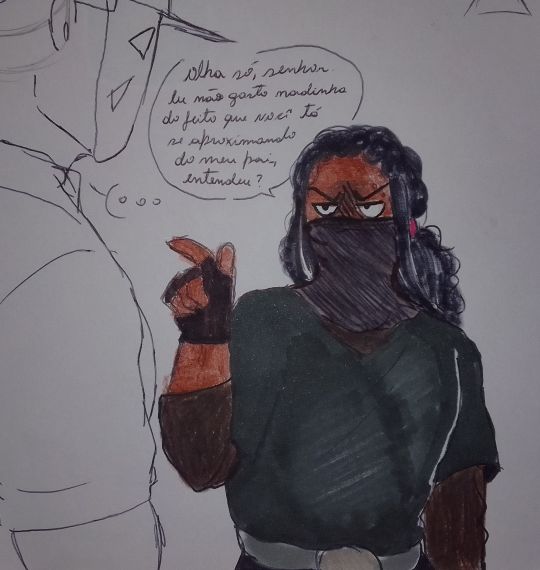
This is my look for Danny Johnson in my fanfic
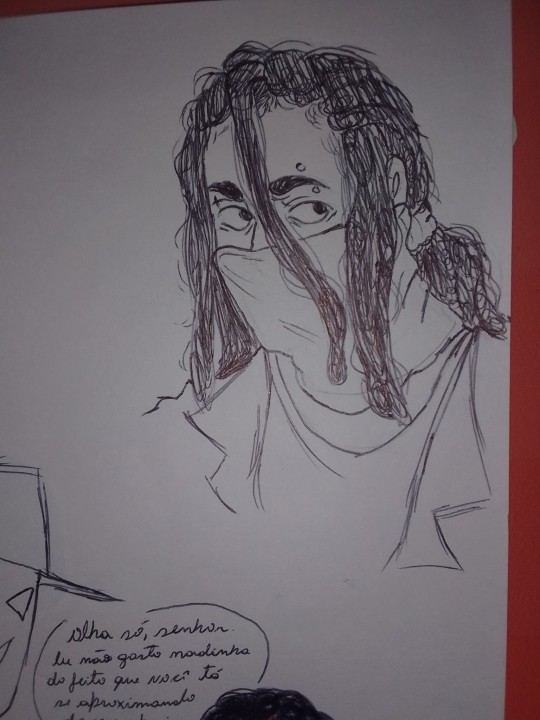

I will still draw more characters for my Fanfic and some additional ones
I already posted some chapters of my Fanfic on Wattpad (the chapters are in Brazilian Portuguese) Maybe I'll post some English version on the same site or on another fanfic platform in the future
@johnnytesticles
#slashers#freddy krueger#candyman#jason voorhees#pinhead#my art#my au stuff#my au#ghostface#leatherface#slasher fanfiction#fanfic#fanfiction#cowboys
30 notes
·
View notes
Text
How Brazil’s Lula added a spring to Xi Jinping’s step
Reducing the dollar’s dominance in global commerce has been a top goal for China

For Xi Jinping, last week was easily among the best the Chinese leader has had in a long while.
First, French President Emmanuel Macron dropped by to talk up the merits of Europe forging a diplomatic path independent of the US. For good measure, Macron gave Beijing the impression Paris isn’t keen on coming to Taiwan’s defense should conflict break out.
Then it was Brazilian President Luiz Inacio Lula da Silva’s turn to make global headlines at Washington’s expense. Lula visited Huawei Technologies, a target of US sanctions. He also entertained Xi’s ceasefire in Ukraine, one Washington has roundly dismissed.
Yet the real tailwind Lula brought to town relates to Xi’s long-held desire to reduce the role of the US dollar.
While visiting Shanghai, Lula urged fellow BRICS economies – Brazil, Russia, India, China and South Africa – to accelerate efforts to supplant the dollar in global trade and finance. He said the BRICS-created New Development Bank should take the lead in wrestling financial power away from Washington.
“Why can’t an institution like the BRICS Bank have a currency to finance trade relations between Brazil and China, between Brazil and all the other BRICS countries?” Lula asked. “Who decided that the dollar was the [trade] currency after the end of gold parity?”
It was music to Xi’s ears. Reducing the dollar’s dominance in global commerce has been a top goal since 2012, when Xi first rose to power. Since then, China has made steady inroads toward increasing the yuan’s use in transactions, payments and bond issuances – including Russian and Saudi Arabian oil sales.
Continue reading.
#brazil#politics#china#chinese politics#brazilian politics#economy#international politics#mod nise da silveira#image description in alt
8 notes
·
View notes
Text
Events 3.28 (after 1940)
1941 – World War II: First day of the Battle of Cape Matapan in Greece between the navies of the United Kingdom and Australia, and the Royal Italian navy.
1942 – World War II: A British combined force permanently disables the Louis Joubert Lock in Saint-Nazaire in order to keep the German battleship Tirpitz away from the mid-ocean convoy lanes.
1946 – Cold War: The United States Department of State releases the Acheson–Lilienthal Report, outlining a plan for the international control of nuclear power.
1959 – The State Council of the People's Republic of China dissolves the government of Tibet.
1961 – ČSA Flight 511 crashes in Igensdorf, Germany, killing 52.
1965 – An Mw 7.4 earthquake in Chile sets off a series of tailings dam failures, burying the town of El Cobre and killing at least 500 people.
1968 – Brazilian high school student Edson Luís de Lima Souto is killed by military police at a student protest.
1969 – Greek poet and Nobel Prize laureate Giorgos Seferis makes a famous statement on the BBC World Service opposing the junta in Greece.
1970 – An earthquake strikes western Turkey at about 23:05 local time, killing 1,086 and injuring at least 1,200.
1978 – The US Supreme Court hands down 5–3 decision in Stump v. Sparkman, a controversial case involving involuntary sterilization and judicial immunity.
1979 – A coolant leak at the Three Mile Island's Unit 2 nuclear reactor outside Harrisburg, Pennsylvania leads to the core overheating and a partial meltdown.
1979 – The British House of Commons passes a vote of no confidence against James Callaghan's government by one vote, precipitating a general election.
1990 – United States President George H. W. Bush posthumously awards Jesse Owens the Congressional Gold Medal.
1994 – In South Africa, African National Congress security guards kill dozens of Inkatha Freedom Party protesters.
1999 – Kosovo War: Serb paramilitary and military forces kill at least 130 Kosovo Albanians in Izbica.
2001 – Athens International Airport Eleftherios Venizelos begins operation.
2003 – In a friendly fire incident, two American A-10 Thunderbolt II aircraft attack British tanks participating in the 2003 invasion of Iraq, killing one soldier.
2005 – An earthquake shakes northern Sumatra with a magnitude of 8.6 and killing over 1000 people.
2006 – At least one million union members, students and unemployed take to the streets in France in protest at the government's proposed First Employment Contract law.
1 note
·
View note
Photo
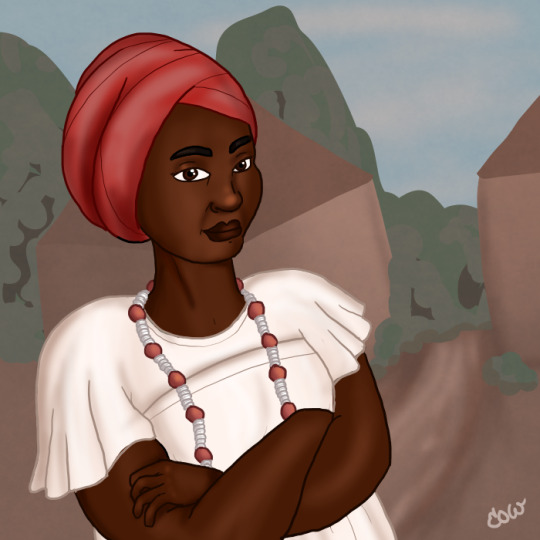
Day 9: Felipa Maria Aranha!
Felipa Maria Aranha was born c.1720 in the Gold Coast of Guinea. She was enslaved while still a child, and endured the Middle Passage to Brazil, where she was put to grueling work harvesting sugarcane.
From the 1500s to 1888, millions of people were enslaved in Brazil - more than anywhere else in the Atlantic slave trade. Like many others, Felipa Maria made her escape into the forest, where she was joined by dozens - eventually hundreds - of fellow escapees. There, on the banks of the Itapoca, Felipa Maria Aranha founded the town of Mola.
Mola was a quilombo, one of many in the Brazilian backcountry - a town founded by African refugees, and, often, by women. Mola had a democratic government and an organized military, and eventually brought together surrounding settlements into the Confederação do Itapocu. Felipa Maria was elected as one of the first leaders, and guided her town and her people until her death in 1780.
Some quilombos were forcefully scattered and relocated, and others faded away, but many remain as thriving communities. From escape to persecution to the remaining threat of dispossession, they - and Felipa Maria Aranha - are icons of resistance in Afro-Brazilian culture.
#felipa maria aranha#history#brazilian history#black history#awesome ladies of history#october 2022#my art#slavery tw
11 notes
·
View notes
Photo
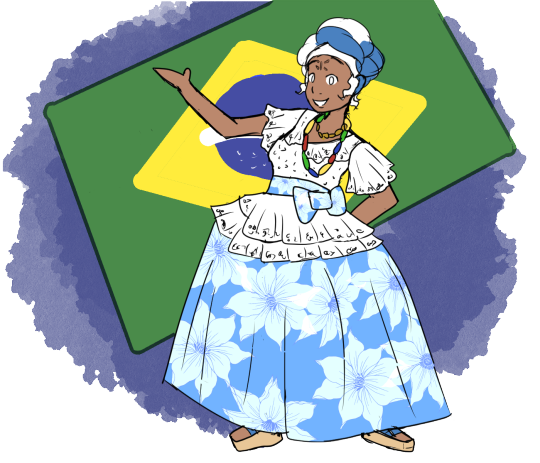

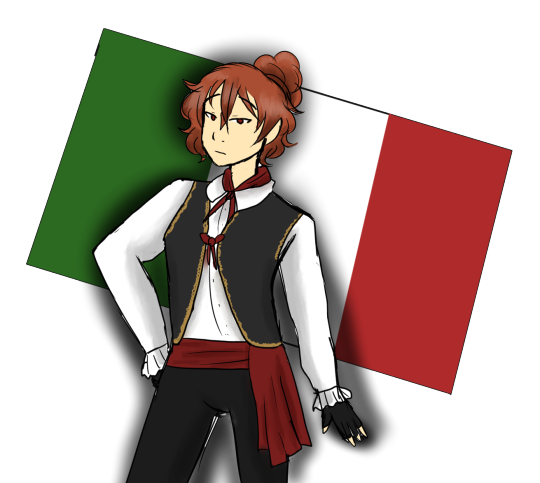

Cultural dress!!!
I have a very wide and diverse cast of characters, and one of my favorite things to do is research their cultures in order to express them the best I can. I’ve done a lot in the past, especially with Si and his family.
So here are some others I’ve been dying to do.
My girl Uriel is Afro-Brazilian and occasionally wears a baiana dress. These are full-skirted dresses worn by Afro-Brazilian women in the Bahia region of Brazil. Uri’s is accented with blue, similar to her standard robes, and is adorned with white clematis flowers. Her baiana features a head wrap (that somehow fits all her curls).
Queen Sathanus is Ghanaian and wears a gown, wrap, and head wrap made from kente cloth, a traditional Ghanian woven fabric. Her dress is slightly more modern than traditional. With kente cloth, the symbols and the colors are meaningful. The colors here represent serenity (gold), renewal (green), passion (red), and spiritual awareness (black).
Terrance is Italian and is wearing traditional Calabrian clothing. Traditional Italian male clothing isn’t named like other styles, but usually consists of sleeveless jackets, or vests, white shirts, and trousers that stop at the knee. Occasionally men also wore wool caps, but Terry’s got too much hair for that.
Lastly is Liat, who is Mexican and Israeli. Though she is biracial, she does tend to identify more with her mother’s Mexican heritage. She is wearing a Chiapas dress, an embroidered floral gown from the town of Chiapa de Corzo. These are usually made of satin and are hand-embroidered.
#OCs#demon oc#angel oc#fantasy oc#historical oc#supernatural oc#demon#Sathanus#Uriel#Terrance#Liat#Doodley doos#digital arwork#original characters#original character#my art
3 notes
·
View notes
Text

MEET THE ACOSTA FAMILY
Migrating to the United States was the Acosta's family reward that they reaped following their successes in the Brazilian Gold Rush. Traveling to the States with their riches in order to establish a new home and create a better life for their family was all that they'd ever wanted for their children and their children's children, so to see it to fruition felt as though they'd completed their life's dream.
The Acostas made it to California in the peak of the North American Gold Rush, but saw very little success compared to that of years previous due to corporations seizing a great deal of the gold mined early on once gold had been found and drying up the mines. In order to preserve what money they had left and still make sure generations to come would know of a better life, the Acostas decided to join in with the other families in the migration north to create their own settlement.
Most notably, the Acostas built what would become the Harborview Hotel and turned it into a labor of love along the coast, where ocean waves rolled in and offered a tranquil place for travelers to stay. The hotel was the first lodging in Fairford, and remains the oldest operational lodging in town to date.
SUGGESTED FCS FOR THE ACOSTA FAMILY:
Camila Mendes, Diego Boneta, Bianca Santos, Rafael Silva, Bruna Marquezine, Anaju Dorigon, Caio Castro, Giovana Cordeiro, Lucy Alves, Henry Zaga.
PLOT | GUIDELINES | ASK | APPLY
#oc rp#oc rpg#town rp#town rpg#skeleton rp#small town rp#small town rpg#literate rp#literate rpg#rp#rpg
0 notes
Text
BBC 0533 18 Feb 2024
6195Khz 0459 18 FEB 2024 - BBC (UNITED KINGDOM) in ENGLISH from SANTA MARIA DI GALERIA. SINPO = 55333. ID@0459z pips and Newsroom preview. @0501z World News anchored by David Harper. In a significant phone call with Ukrainian President Volodymyr Zelensky, President Joe Biden linked the distressing withdrawal of Ukrainian forces from the critical town of Avdiivka directly to the U.S. Congress’ failure to pass additional aid for Ukraine. This lapse has forced Ukrainian soldiers into a precarious position, rationing ammunition amidst dwindling supplies, culminating in a notable Russian advance for the first time in months. This development underscores the dire need for Congress to act swiftly and pass the national security supplemental funding bill to bolster Ukrainian forces. Despite the Senate’s approval of a significant $95.3 billion foreign aid package, which includes crucial support for Ukraine, the bill’s advancement is stalled by GOP House Speaker Mike Johnson’s hesitation to present it for a vote, along with the House being on a recess, raising concerns about the U.S.’s dependability as a reliable ally amid Ukraine’s growing needs. Thailand's billionaire former Prime Minister Thaksin Shinawatra was released on parole on Sunday after six months in detention, his first day of freedom in his homeland 15 years after fleeing in the wake of his overthrow in a military coup. Talks to agree a ceasefire between Israel and Hamas in Gaza were "not very promising" in recent days, mediator Qatar has said. Prime Minister Mohammed bin Abdulrahman Al Thani said he remained optimistic, but added "time is not in our favour". It comes as Israel's prime minister said he would press ahead with plans for a Rafah ground invasion, despite growing international pressure. British Foreign Minister David Cameron will visit the Falkland Islands as part of his first South Atlantic and South American tour since assuming his current role, the foreign office said on Sunday. "The Falkland Islands are a valued part of the British family, and we are clear that as long as they want to remain part of the family, the issue of sovereignty will not be up for discussion," Cameron said in a statement. A group of asylum seekers on an isolated British island territory have told UN investigators they feel unsafe and forgotten, as they reported sexual assaults and harassment of children, as well as self-harm and suicide attempts. Inspectors from the UN's refugee agency visited Diego Garcia, in the Indian Ocean, to check on their welfare. They found that conditions there amounted to arbitrary detention. The Foreign Office said the island was not suitable for migrants to live on. A Brazilian court fined executives and companies, including French transportation giant Alstom, a total of $48 million for a 2007 collapse at a subway construction site that killed seven people, in a ruling finding their "administrative misconduct" led to the cave-in. U.S. Secretary of Homeland Security Alejandro Mayorkas met Saturday with newly elected Guatemalan President Bernardo Arévalo and discussed regional migration, security and the economy in the Central American nation, they said. The meeting at the Munich Security Conference came days after the Republican-controlled U.S. House of Representatives voted to impeach Mayorkas for the administration’s handling of migrants at the U.S. southern border. Former US President Donald Trump has launched his own line of Trump-branded shoes at Sneaker Con, a convention for sneaker fans in Philadelphia. His appearance was met with loud boos as well as cheers after he presented a pair of the gold-coloured shoes being sold online for $399. His move comes a day after a judge ordered him to pay nearly $355m (£281m) to New York state for lying about the values of his properties. @0505z "The Newsroom" begins. MLA 30 amplified loop (powered w/8 AA rechargeable batteries ~10.8vdc), Etón e1XM. 250kW, beamAz 185°, bearing 49°. Received at Plymouth, United States, 7877KM from transmitter at Santa Maria di Galeria. Local time: 2259.
0 notes
Text
youtube
First look at Eureka
A new trailer has been released for Eureka. No release date was specified.
The protean Argentinean director Lisandro Alonso continues to shapeshift, delight, and challenge with his marvelous and immersive new film, which takes the viewer on an unexpected journey through three stories set in wildly different terrain, each of them reflecting lives haunted by the specter of colonialist violence. In the first, Viggo Mortensen and Chiara Mastroianni guest-star in a black-and-white neo-Western pastiche following a taciturn gunslinger seeking revenge in a lawless frontier town. In the second section, in a different kind of law-and-order narrative, set during the present day in the Pine Ridge Reservation in South Dakota, we accompany a Native American cop (Alaina Clifford) on her nighttime patrols, revealing a community troubled by addiction and poverty, but also, because of the cop’s good-hearted basketball coach niece (Sadie Lapointe), touched by transcendence. Finally, the film travels to the magnificent Brazilian rainforest of the 1970s, where Indigenous workers pan for gold while articulating their dream lives. Cleverly transitioning between segments without hand-holding the viewer, Alonso has created an improbably unified aesthetic experience that leaves it up to us to make the connections among its transient worlds.
0 notes
Note
idk if ur still taking questions, but i wanted to ask more about the wild west au :D the premise is rlly cool and i’d love to hear u talk about any other ideas u have about it!
The au in question: HERE
Alright, so the first thing to know is that every single legend about these mysterious bandits is true. Magic is real, and its name is the desert.
Richarlyson is a little Brazilian boy miles and miles away from home that just so happened to be born with a cow's head instead of a human one. Bad is a demon from Hell (real, not clickbait.) Foolish stole an entire state's worth of gold and he doesn't regret shit. Jaiden steals cattle 'cause she doesn't give a shit about the law. And Roier? He'd never admit he's a good shot, but he's the best the town has got, not that anyone but Jaiden knows it.
The thing about the West is that you went there to become someone new. Nobody moved West to be the same person they were in Virginia or New York or even goddamn Ohio, you were to reinvent yourself.
Or, rather, you moved West so the land could reinvent you. Nobody comes out the same as you go in.
So color Cellbit surprised when stories start popping up about a feral cat-man wandering the hills around Perfection with knives for claws. Rumor has it he eats little children who wander too far from the town too late at night, but that's ridiculous, right? There's no such thing as monsters, just men whose reputations have gotten ahead of them.
But then Cellbit wakes up one morning and accidentally cuts himself on his own fingernails, he's forced to wonder if, shit, maybe the stories are a bit more than just stories.
67 notes
·
View notes
Text
gold rush: Richie/Eddie + meeting during the 27 years (3/3 3/4 oops)
Summary:
Eddie “meets” Richie at a bar while they’re both out of town for work, and immediately decides right now is the perfect time to have his midlife crisis.
"Okay, alright," Ben placates when the laughter goes long, gesturing for everyone to settle down, only half genuine. "How 'bout you, Eddie? You married?"
"Uh, no," Eddie mumbles, emerging reluctantly from his one-handed cocoon. He debates for a moment, feeling sick. But he has to make sure Richie gets the full picture, now that he has to have any of it. "Engaged. Or I was a year ago, anyway." Richie goes still and silent next to him, his hands freezing where they had been using his chopsticks to whack out a shitty little drumline on the cloth-covered table.
"What happened?" Ben asks softly, sympathetically. Eddie's throat hurts; the truth hurts. He coughs it away as best he can.
"I moved," he says. "For- uh. For work." Like Pretty fucking Woman. Richie fumbles putting down his chopsticks, tucks his hands under the table. Eddie watches him do it through his peripheral vision.
"Sorry to hear that, Eds," Mike murmurs across the now quiet table. Eddie tenses up to hold back a flinch at the nickname. Richie came up with that nickname. Twice. He hasn't used it since they got here.
"So, anyway!" Richie says instead, cutting through the atmosphere like a fucking anvil, like he always did as a kid. He brings his hands back up to gesture wildly. "Ben! Where's the rest of you?"
"I- Yeah, I guess I lost a few pounds," Ben says, chuckling awkwardly. Eddie, Bill, and Mike all make noises of agreement - Eddie maybe a little more enthusiastically than required, latching onto the change of subject eagerly.
"You're hot!" Richie gushes. Eddie can't help but look Ben over, almost as if directed to do so by Richie's words. His eyes sweep up and down Ben's body like a compass needle sweeping around to point North. He admires, for a moment, Ben's somewhat dainty wrists, his bulging shoulders, his thick thighs under the table. The tightness of his fucking cowboy jeans, too, makes for a prettier picture in between them than a looser fit would provide.
But then Richie goes on. "You're gorgeous, man! You're like if every Brazilian soccer player was rolled into one person." He pauses there, and sitting so close at hand, Eddie can hear him take a shaking breath, hyping himself up. Braced, he finishes, "Do you like men? Asking for a friend."
Suddenly, Eddie isn't so enthused with this topic anymore.
There's easy laughter from everyone else, and then a pause when what Richie's said sinks in. Then laughter again, to Richie's palpable relief.
"That would be so weird," Bill says, making a face.
"What?" Richie demands. "Only you're allowed to date fellow Losers?"
"Leader privileges," Bill says with a smirk and a nod.
"Okay, gross," Richie condemns, ruining it by laughing halfway through. He turns back to Ben and adds, "Apparently the friend I'm asking for is Bill. Would you date Bill, Ben? Would you let Bill touch your rock hard washboard abs, Ben?"
"Oh my God," says Ben, hiding his glowing face behind his beer.
"Leave him alone, you're embarrassing him," Bev reprimands, sounding like she's never meant anything less in her life. Eddie can't really blame her - Ben's blush is as adorable as it's ever been, now with the added visual benefits of a strong jaw and a handsomely trimmed goatee. However, he would personally strongly prefer if Richie did leave Ben alone.
"What dat ass do? For Bill, I mean." Richie is relentless, though he's honestly looking more at Bill than Ben at this point. Bill, who is choking he's laughing so hard, face so red he's putting Ben's alluring blush to shame - exclusively in terms of shade. While Ben makes for a bashful Prince Charming, Bill looks like a baking tomato that is about to explode in the oven.
"Jesus, somebody save me," Ben pleads. "Where the hell is Stanley?"
Read More ->
Or start at the beginning.
15 notes
·
View notes
Text
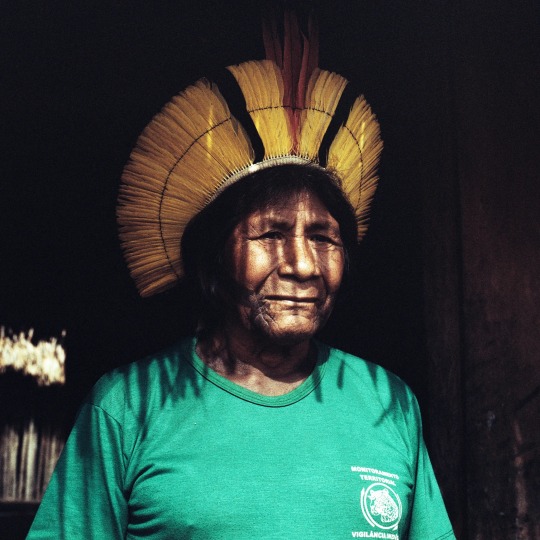
The pajé, or Traditional Healer, of an Indigenous Kayapo community. The Indigenous are, by tradition and by law, the stewards of much of the Amazon’s intact wilderness—but the fight over resources has divided them. Photographs by Larissa Zaidan for The New Yorker
Who Can Save the Amazon?
Brazil’s President, Luiz Inácio Lula da Silva, promises to keep miners and loggers from destroying the rain forest. On the ground, the fight is complicated.
— By Jon Lee Anderson | April 03, 2023
The Brazilian Amazon is riven by two long highways, in the shape of a cross: the BR-163, which extends more than four thousand miles from north to south, and the Trans-Amazonian, which runs twenty-four hundred miles from east to west. The roads were carved from the jungle in the nineteen-seventies, to open the wilderness to settlers and development. The effects have been calamitous. As colonists flooded in, the human population in Brazil’s Amazon has quadrupled, to nearly thirty million. The settlers have created a patchwork of new roads and towns, burning or cutting down millions of acres of forest to harvest timber or to clear land for cattle pasture or soybeans; they have polluted the rivers with mercury as they pan for gold. Since the highways were built, an estimated twenty per cent of the rain forest has been destroyed.
Not long ago, I travelled with the Brazilian photographer Larissa Zaidan from São Paulo to Novo Progresso, a prominent way station along the BR-163. The trip gave a sense of Brazil’s immensity: an hour and a half by plane to the agricultural hub of Sinop, then a ten-hour drive north. For much of the journey, the forest had been shoved back from the road, to make way for grain fields or cattle pasture. Trucks barrelled along, loaded with timber, livestock, and especially soy—the road is known as the Soy Highway. Many vehicles were decorated with green-and-yellow Brazilian flags, an expression of allegiance to Jair Bolsonaro, the country’s right-wing leader. Bolsonaro was defeated in the recent election by Luiz Inácio Lula da Silva, but his supporters, the Bolsonaristas, still regard him as an emblem of belligerent resistance to anything regarded as aligned with the left.
In office, Bolsonaro had promoted new laws to open up the region’s preserves to loggers, miners, and agribusiness, which inevitably meant burning more of the forest. As fires in the Amazon raged out of control, the smoke clouds were so thick that the skies above São Paulo, hundreds of miles away, became dark for several days. At one point, the French President, Emmanuel Macron, questioned Brazil’s sovereignty over a wilderness that all of humanity depended upon for survival. Bolsonaro reacted by making vulgar comments about Macron’s wife.
An area of the rain forest the size of Belgium was burned during Bolsonaro’s Presidency. Bolsonaro blamed the destruction, absurdly, on a series of foreigners. When I saw Lula in 2019, as he was beginning to ponder a run for office, he exclaimed, “Bolsonaro thinks it was Leonardo DiCaprio who set fire to the Amazon. He thinks it was European N.G.O.s that set fire to the Amazon. He thinks it was Venezuela that poured oil to pollute the beaches of the northeast. That is an insane mind.”
After Lula was reëlected, late last year, he appointed Marina Silva, a widely admired conservationist, as his environment minister. She had served in that role for five years during Lula’s earlier stint as President, but had resigned over his insistence on balancing conservation and development. (One of their disagreements was over the BR-163, which Lula began paving.) Now Lula had invited her back, promising to halt deforestation. After the election, Lula told me that he intended to fulfill his pledge. But he also expressed concern about how unstable the Amazon had become, and he mentioned the boomtown of Novo Progresso as a worrying case in point.
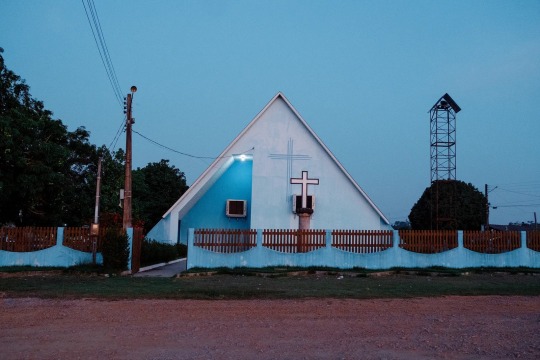
A church on the road to the frontier town of Novo Progresso. In recent decades, evangelical Christianity has boomed in Brazil, providing support to right-wing politicians.
Like many Amazonian frontier towns, Novo Progresso consisted of a roadside strip lined with businesses: truck stops, gold exchanges, hardware stores, bars, evangelical churches, a brothel. A grid of houses extended behind the shop fronts on either side, giving way eventually to bushland and cattle ranches. The jungle had been cleared away from the road for several miles.
This was Bolsonaro country. There were no Lula posters to be seen, but on the way to town we had passed a roadside camp of Bolsonaristas, hung with protest banners decrying the Supreme Court’s decision that Lula had won the election fairly, and calling for “Impeachment Now!” Zaidan and I had been warned to be discreet in Novo Progresso, where many residents were hostile toward journalists, and toward anyone connected with environmental causes. At our motel, the manager asked if we were reporters. We told him no—we were scouting locations for a guarana commercial. With a suspicious look, he replied that it seemed a long way to go to do that.
During Bolsonaro’s first year in office, ranchers around Novo Progresso had proclaimed a “Fire Day” and proceeded to torch the jungle. Like many others who live in the Amazon, they regard the region’s resources as an opportunity, not as a moral obligation. When Biden Administration officials sought to work with Bolsonaro’s government on conservation, the environment minister, Ricardo Salles, proposed instead that Brazil be paid not to burn its forests. (In 2021, Salles was forced to resign after police named him as a suspect in a timber-trafficking venture; he denies any involvement.) When I talked with Salles in São Paulo, he argued that Brazil should not have to sacrifice in order to benefit the rest of the world: “Rich countries are saying, ‘You have to continue to help me to solve the problem that I created. But now we’re going to split the bill.’ I say, ‘No, we’re not going to split the bill. You destroy, you pay.’ ”
In the Amazon, where pristine wilderness often sits alongside degraded land, the question of ownership is fiercely contested—especially where it concerns Indigenous people. Not far from Novo Progresso is the Baú Indigenous Reserve, which Lula created during his previous stint in office. The reserve, some 3.8 million acres of rain forest, is home to several communities of Kayapo—one of the Amazon’s main groups of Indigenous people, who began interacting regularly with settlers in the nineteen-fifties. About twenty-two per cent of the Amazon region now lies within protected reserves such as Baú, but in many places their forests and rivers have been overrun by loggers and gold miners. Bolsonaro vowed to demarcate “not a single millimetre” of Indigenous land during his Presidency, and he had kept his word.

Dulce Sousa, a resident of Novo Progresso, agrees with the former President Jair Bolsonaro that local residents should be free to profit from the forest’s resources.
In Novo Progresso, a woman named Dulce Sousa broke with Bolsonarista protocol by inviting us to her house for coffee. Dulce lives on a residential street near the BR-163, in a modest house with a yard decorated by statues of a cow and a horse. A hale woman in her mid-forties, she ushered us into her kitchen. Her husband, a truck driver, was on the road, but her two teen-age sons wandered in and joined us.
Dulce was from a family of farmers that had come to Novo Progresso twenty years before, hoping to thrive in the newly opened frontier. They had acquired a large tract outside town, but during Lula’s earlier Presidency authorities had stopped them from planting it; it was near Indigenous territory, whose borders were unresolved. Since then, she said, her land had sat idle. Still, she said, she had respected the law, and had made a living instead as a teacher. For a time, she had taught at a Kayapo school in the Baú reserve.
Dulce, like Bolsonaro, insisted that the Indigenous people should be allowed to profit from the forest, even if it means abandoning their traditions. “For me, democracy means that they can choose what they want to do,” she said. “If they want to live from farming, that’s fine. If they want to live on agribusiness, why can’t they? Their perspective is, Why do I have to live in a forest with all these riches that they say exist but, for me to go to the market, I need to wait for my Bolsa Família”—a kind of welfare check—“or the next harvest? They have this desire. Even those who say they don’t have the desire have it. But there are people above them who oppress them.”
After the recent Presidential election, Dulce had joined a demonstration at the edge of town, where Bolsonaristas were blocking the highway—the same conflict that Lula had mentioned to me. She believed, like Bolsonaro, that Lula was a communist and a thief. “Who would vote for a thief?” she said. When I asked whether Bolsonaro was immune to corruption, she said that she didn’t particularly care if he won, as long as Lula lost: “Let the military take over the government.”
The rally had devolved into gunfire between the police and the Bolsonaristas. Dulce had a plastic bag of mementos, which she spilled onto the kitchen table: spent rubber bullets, tear-gas cannisters, brass shell casings. Among the protesters, she said, were Kayapo who supported mining and logging on the reserve. “Why were they there?” she asked. “Because they want to work, to learn from us, and to produce.”
Many of the region’s Indigenous activists rejected this idea. On Novo Progresso’s main strip, a Kayapo N.G.O. called Instituto Kabu maintained a walled compound, patrolled by an armed guard. When we arrived, we found a sturdily built man with a headdress of parrot feathers working on a laptop. He was Mydjere Mekrãgnotire, the organization’s vice-president. Mydjere, who also served as the coördinator of Indigenous education for Pará state, spoke urgently about a dire situation.
“More than four years ago, there was not much deforestation around Novo Progresso,” he said. “But after President Bolsonaro said that he was going to allow people to mine inside Indigenous lands, that he was going to allow Indigenous people to produce inside their reserves, and do agribusiness, that’s when the prospectors and loggers said, ‘Hey, he’s on our side, let’s invade.’ ”
During the most intense periods of clearing land, Mydjere told me, “You see smoke, burning everywhere.” He argued that Kayapo who coöperated with outsiders were being deceived. “The prospectors, the loggers go straight to the chiefs and make false promises,” he said. “They say that they are going to extract gold from the land and that the chiefs are going to get rich. ‘I will give you a truck,’ they say. And the chiefs end up falling into the trap. But, when they make these arrangements, only the chiefs benefit. The community does not.”

On the road from Novo Progresso to Baú Village.
The white settlers of Novo Progresso had a transactional interest in the Kayapo, Mydjere told me: “They say they are our friends, but, after they run out of all the gold and wood, they are no longer friends. In the city of Novo Progresso, they are not very friendly to us Indigenous people who defend the environment.”
A couple of months earlier, Mydjere said, the staff at Kabu had received an anonymous threat: leave town or die. For a time, everyone had been too frightened to go to the office, but eventually they had returned, and so far nothing more had happened. But, he added worriedly, the recent violent protest that Dulce Sousa mentioned had been organized by the same loggers, ranchers, prospectors, and businessmen who had been invading the Kayapo lands. “With this new government of Lula’s, he says that there will be no mining in the Indigenous land,” he said. “He says he will not allow deforestation for agribusiness. That’s why people don’t like him.”
While I was visiting Novo Progresso, Lula was in Egypt for the cop27 climate-change conference, where he met with Brazilian Indigenous leaders and vowed his total support. In mid-January, a few days after thousands of Bolsonaristas launched a riotous attack on the capital, Lula announced that an activist named Sônia Guajajara would serve as the leader of a newly created ministry for Indigenous peoples. Later, the two visited the territory of the Yanomami people, a huge reserve in the northern Amazon. During Bolsonaro’s tenure, twenty thousand gold prospectors—garimpeiros—had invaded, spreading disease and destruction. Lula called what was being done to the Yanomami a “genocide,” and vowed to clear out the miners. People in Novo Progresso took notice. It was the same conflict that had subsumed the Kayapo of the Baú reserve.
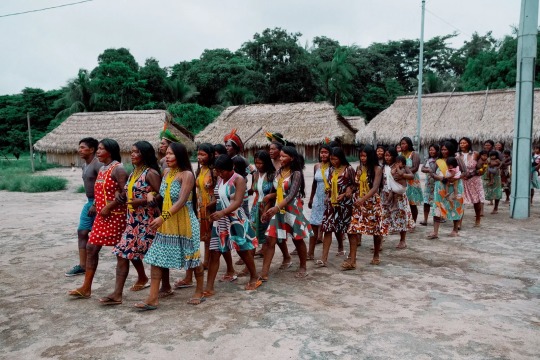
A welcome ritual performed by the Kayapo.
To reach the reserve’s main village from Novo Progresso, we drove three hours into the jungle by jeep, starting on a muddy track that leads off the BR-163 through cleared ranchlands. Here and there stood towering Brazil-nut trees, which are protected by law—often the only great trees left standing in the burned-out fields. Along the roadside, smoke rose from a fire as it ate into the edge of the forest.
As we drove, the devastation abruptly ended, and the forest grew thick: we were in the reserve. At a split in the muddy track, a handwritten sign indicated that Baú Village was to the left. To the right was the rival community, the one involved in gold mining.
Baú was organized in traditional Kayapo fashion, with communal family dwellings made of wood planks, set around a cleared circle. At the center was an open-sided meeting house with an earthen floor and wooden benches. A few dozen villagers assembled there, and Baú’s chief introduced herself: Panh-Ô, Mydjere’s sister. A strong-bodied woman in her forties, she wore a polka-dotted red dress, a beaded necklace, and a large red cross painted on her face. A man with a red stripe across his cheekbones introduced himself in Portuguese as Kremaiti, Panh-Ô’s husband; he would translate for his wife, who spoke only Kayapo.

Left: Panh-Ô, a Kayapo leader, describes strife between Indigenous people who want to protect the forest and those who want to extract its resources. “We’re in conflict now,” she says. Right: Mydjere Mekrãgnotire, of the Indigenous-rights group Instituto Kabu.
“Most of us here in Baú are against gold mining and logging, but some like it, and that has divided us,” he said. Bolsonaro’s discourse about opening the Indigenous reserves to extraction had seduced some people in his own community, and ultimately this had divided them. A few such Kayapo supported Bolsonaro, though Kremaiti couldn’t understand how. Bolsonaro, he pointed out, had spoken ill of Indigenous people and had even insulted their ancestral chief, Raoni. (In an emblematic gesture, Lula invited Raoni, an elderly man with a resplendent macaw-feather headdress, to the stage during his inauguration.)
Kremaiti said that the men of Baú had established a surveillance team to defend their forest. They had recently discovered prospectors in a remote area of the reservation, and had detained them and confiscated their equipment. “We’re providing an example to the other Indigenous people of Brazil,” he said. “We hope it shows them that our traditional way of life can continue.”
Panh-Ô seemed less confident about the future, noting that a British mining company had recently secured a government license to explore for gold just outside the Baú reserve. They had a Brazilian partner and had recently begun drilling. ”We can hear them, and feel the ground shake,” Panh-Ô said. “They say they are outside of Indigenous land, but I think they’re working inside.”
Even within the reserve, divisions festered over logging and mining. Panh-Ô said that the community had begun to split up in 2019, and there were now seven Kayapo villages in the preserve; of them, only Baú remained opposed to mining. “I’ve tried talking to them, but they want to carry on working with the garimpo,” she said. “I will continue to try to convince them. I want the river to be clean again. We have had some birth defects and problems with deformed infants, and we think it’s because they have contaminated the river water with mercury.” (One other village has since joined Instituto Kabu and agreed to stop mining.)
The nearest garimpo village was just beyond the tree line, a few minutes’ walk away. “The villages that work with the garimpo have stopped talking to us,” Panh-Ô said. “We’re in conflict now.”
Kremaiti’s entire family was in the other village, and his sister was angry at him: “She says I should come back over, build myself a house and work with them. But I want to live here and die here, this is the land I must fight for.”
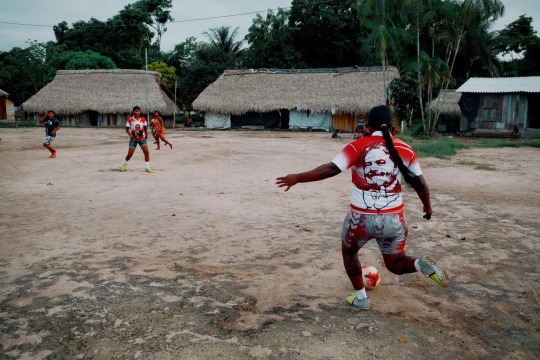
In Baú Village, the photographer Larissa Zaidan fell into the rhythms of daily life, spending time with a roving gang of young girls, with young men playing soccer, and with mothers and infants. For Zaidan, the camera is an adjunct to the experience. If the moment seems right for a photo, she takes it, but she is primarily there to share the moment.
While the battle carries on around Baú, the community busies itself with chores and pastimes. Women work at minding children, cooking, and washing clothes; young girls help out, or gather to talk and laugh. In the afternoon, many of the Kayapo go to the river to bathe, and teen-age boys play hotly contested games of soccer. In the evening, a generator is switched on, and everyone comes to charge their phones.
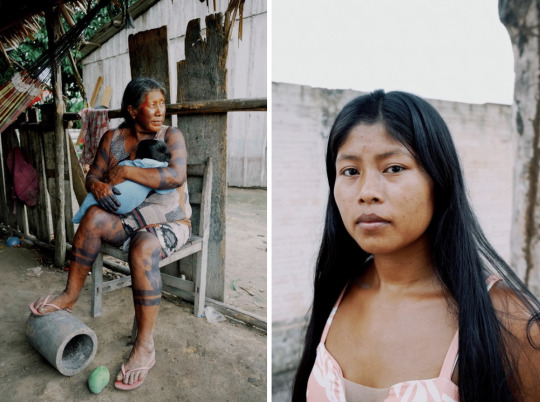
Left: In Baú Village, Kayapo traditions sometimes conflict with the influence of settlers, many of whom have arrived only in the past few decades. Right: Rosimeire, a former resident, has left the village because she is dating a settler.
One morning during our visit, Baú’s young men went into the forest to plant yucca seedlings with a visiting environmental-affairs team; the program was intended to teach farming skills to the Kayapo. Other men were policing the rivers and the woods. Just beyond the circle of houses stood a small schoolhouse and clinic, staffed by a pair of state-funded teachers and a nurse. A stream of Kayapo women with infants visited the clinic for treatment. From his stoop, Atoroget, Baú’s pajé, or healer, observed village life in a peaceable-seeming state of semi-retirement, but he lamented that none of the youngsters seemed interested in the traditional arts of healing. “They just want to play ball,” he said. A teen-age nephew who was present protested, “That isn’t true! I want to learn.” Atoroget pretended not to hear him, but he smiled.
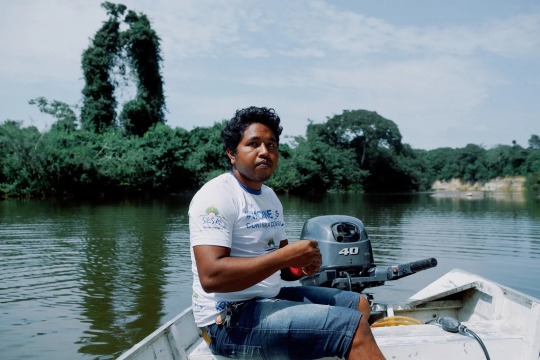
Near Kayapo communities that forbid gold mining, the river is clear. Where mining is permitted, the water is tainted by churned-up mud and mercury.
Panh-Ô wanted us to see the state of the river, and so the next morning we boarded a canoe equipped with an outboard engine. As we pulled out into the current, a Kayapo boatman pointed up the shoreline to the rival community, where a massive pile of dirt had been mounded up: tailings from the mines. We passed a sandbar that had been torn up in the search for gold; it looked like a bomb site. The river was red with mud churned up by the mining.
After an hour, another river joined the one we were on, and the boatman showed us that its waters were clear and pure. Not far upriver, a couple of young men from the rival village sat in a canoe in the shade of a tree. They had cast lines into the water, hoping to catch fish where the water was still clean. They stared at us. No one said a thing.

Kayapo children at play.
0 notes